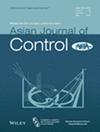Hidden Markov model‐based filtering for 2‐D Markov jump Roesser systems subject to analog fading channels
IF 2.7
4区 计算机科学
Q2 AUTOMATION & CONTROL SYSTEMS
引用次数: 0
Abstract
This article considers the filtering problem for 2‐D Markov jump Roesser systems, in which the measurement signal is transmitted via analog fading channels. The time‐varying amplitude attenuation of the analog fading channels is described by the fading gain modeled as a random variable. The hidden Markov model is used to deal with the mode mismatch phenomenon between the plant and the filter, then a full‐order asynchronous filter is designed for 2‐D Markov jump Roesser systems under analog fading channels. The purpose is to introduce a filter to guarantee that the filtering error system is not only asymptotically mean square stable, but also satisfies the disturbance attenuation performance. An improved decoupling method is proposed to acquire the 2‐D filter parameters such that the conservatism of the 2‐D filter designed law can be effectively reduced. Finally, a verification example and Darboux equation are given to illustrate the validity of the introduced asynchronous filter design law.基于隐马尔可夫模型的二维马尔可夫跃迁 Roesser 系统模拟衰减信道滤波技术
本文探讨了二维马尔可夫跃迁罗塞系统的滤波问题,其中测量信号通过模拟衰减信道传输。模拟衰减信道的时变振幅衰减由模拟为随机变量的衰减增益来描述。利用隐马尔可夫模型来处理工厂和滤波器之间的模式失配现象,然后为模拟衰落信道下的二维马尔可夫跃迁罗塞尔系统设计了一个全阶异步滤波器。目的是引入一种滤波器,保证滤波误差系统不仅渐近均方稳定,而且满足扰动衰减性能。此外,还提出了一种改进的解耦方法来获取二维滤波器参数,从而有效降低二维滤波器设计规律的保守性。最后,给出了一个验证实例和 Darboux 方程,以说明所引入的异步滤波器设计法的有效性。
本文章由计算机程序翻译,如有差异,请以英文原文为准。
求助全文
约1分钟内获得全文
求助全文
来源期刊

Asian Journal of Control
工程技术-自动化与控制系统
CiteScore
4.80
自引率
25.00%
发文量
253
审稿时长
7.2 months
期刊介绍:
The Asian Journal of Control, an Asian Control Association (ACA) and Chinese Automatic Control Society (CACS) affiliated journal, is the first international journal originating from the Asia Pacific region. The Asian Journal of Control publishes papers on original theoretical and practical research and developments in the areas of control, involving all facets of control theory and its application.
Published six times a year, the Journal aims to be a key platform for control communities throughout the world.
The Journal provides a forum where control researchers and practitioners can exchange knowledge and experiences on the latest advances in the control areas, and plays an educational role for students and experienced researchers in other disciplines interested in this continually growing field. The scope of the journal is extensive.
Topics include:
The theory and design of control systems and components, encompassing:
Robust and distributed control using geometric, optimal, stochastic and nonlinear methods
Game theory and state estimation
Adaptive control, including neural networks, learning, parameter estimation
and system fault detection
Artificial intelligence, fuzzy and expert systems
Hierarchical and man-machine systems
All parts of systems engineering which consider the reliability of components and systems
Emerging application areas, such as:
Robotics
Mechatronics
Computers for computer-aided design, manufacturing, and control of
various industrial processes
Space vehicles and aircraft, ships, and traffic
Biomedical systems
National economies
Power systems
Agriculture
Natural resources.
 求助内容:
求助内容: 应助结果提醒方式:
应助结果提醒方式:


